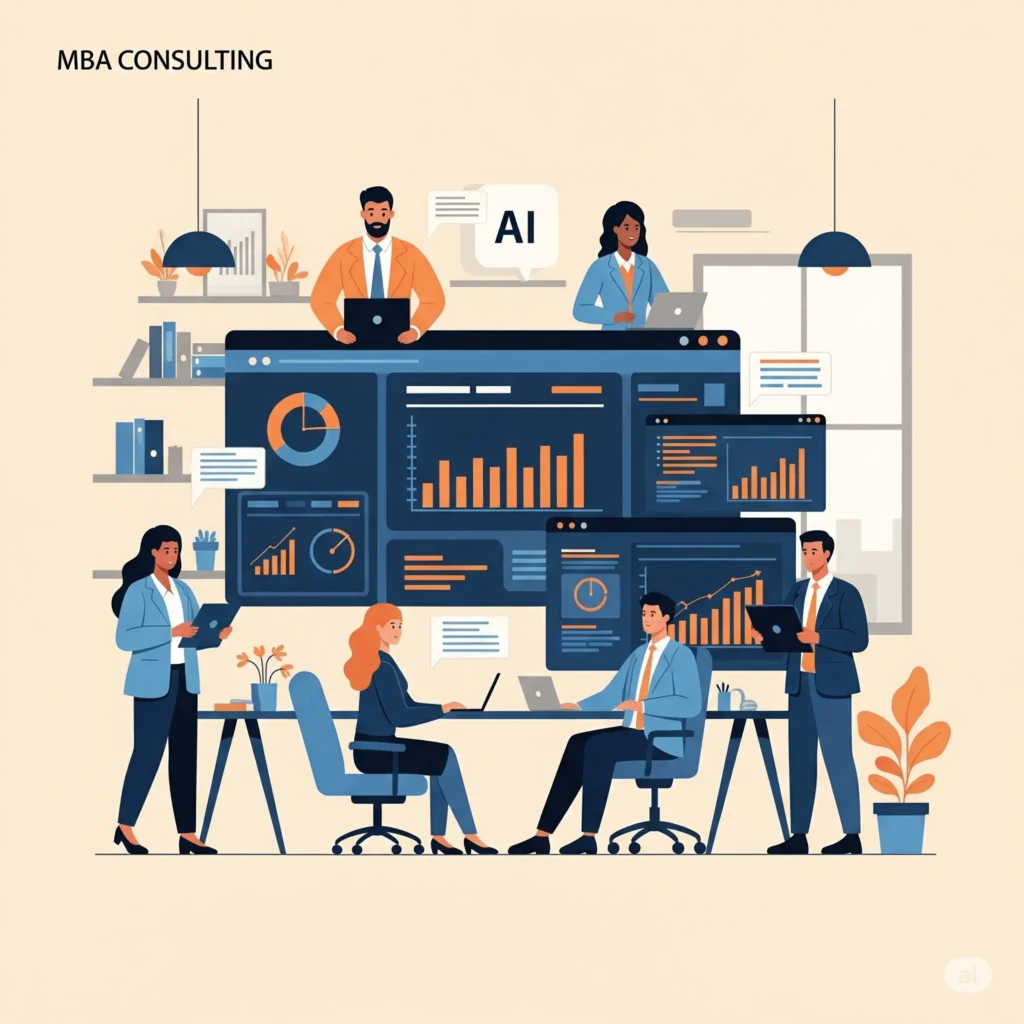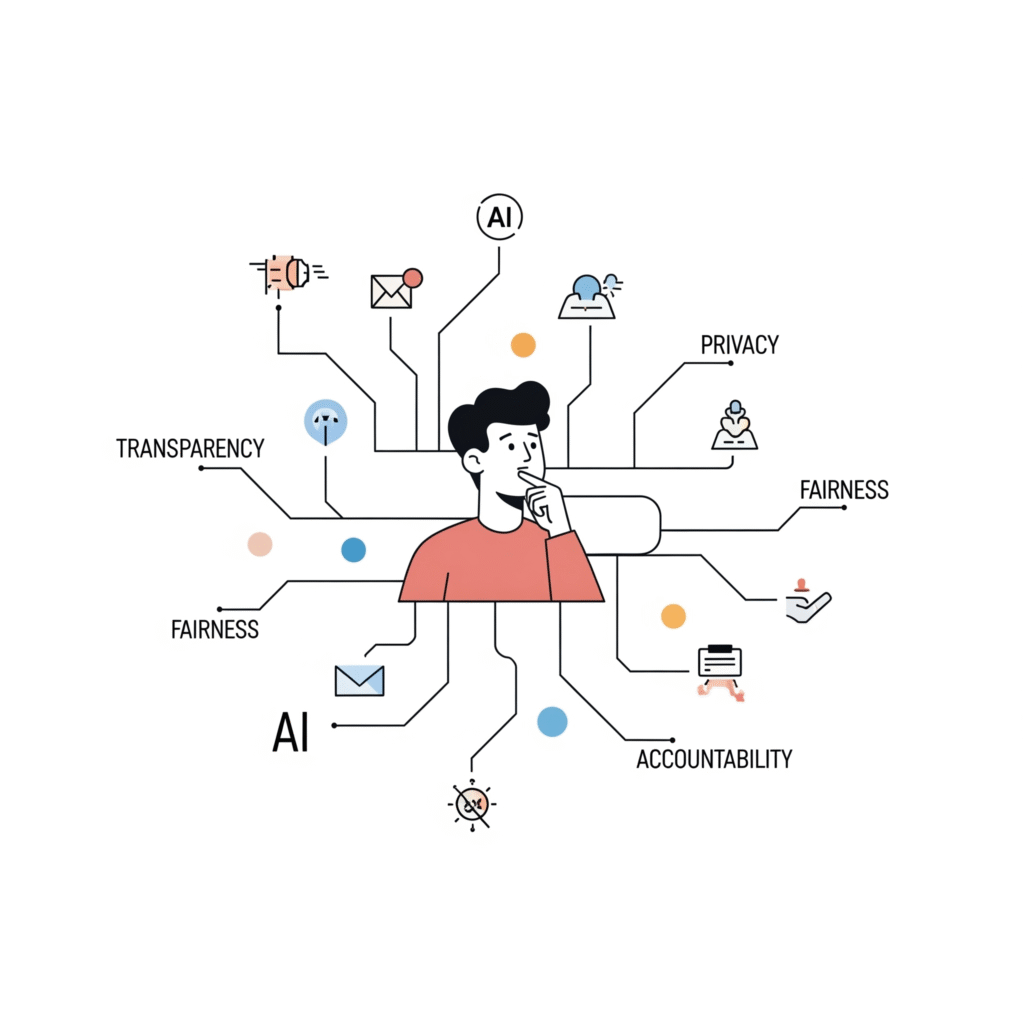MBA Consulting Case Studies: How AI Solves Real Business Problems
Unlock the power of Artificial Intelligence to tackle complex challenges and drive unparalleled business growth.

The Rise of AI in Consulting: A New Era for MBA Graduates
The consulting industry, long reliant on human expertise and analytical prowess, is experiencing a profound shift. Artificial intelligence is not just a trend; it’s a fundamental change agent, reshaping methodologies, deliverables, and the very skill sets required for success. For MBA graduates aspiring to lead in this dynamic field, understanding Artificial Intelligence for Consultants is paramount.
AI’s ability to process vast datasets, identify intricate patterns, and automate repetitive tasks has augmented consultants’ capabilities, allowing them to focus on higher-value activities such as strategic conceptualization, client relationship building, and nuanced problem interpretation. This integration means faster diagnostics, more accurate forecasts, and innovative solutions. The modern consultant is no longer just a problem-solver but an “augmented consultant” – a strategic partner empowered by cutting-edge technology. This new era demands a blend of traditional business acumen and a solid grasp of AI capabilities, making MBA AI Consulting Solutions highly sought after.
Understanding AI’s Core Capabilities for Business Problems
To truly appreciate how AI solves real business problems, it’s essential to grasp its core capabilities. AI isn’t a single technology but an umbrella term encompassing various powerful tools and techniques, each with unique applications in a business context. Understanding these can help you identify opportunities for AI Business Problem Solving.
- Machine Learning (ML) Applications: At the heart of many AI solutions, ML algorithms enable systems to learn from data without explicit programming. This is crucial for predictive analytics, forecasting trends, and identifying anomalies.
- Natural Language Processing (NLP): NLP empowers computers to understand, interpret, and generate human language. It’s invaluable for analyzing customer feedback, automating support, and streamlining document review processes.
- Predictive Analytics: By applying statistical algorithms and machine learning techniques, predictive analytics utilizes historical data to forecast future outcomes. This capability is critical for risk management, demand forecasting, and anticipating market shifts.
- Computer Vision: This field enables machines to “see” and interpret visual information. Its applications range from quality control in manufacturing to enhancing security and optimizing retail layouts.
- Intelligent Automation: Combining robotic process automation (RPA) with AI, intelligent automation streamlines complex, multi-step processes, freeing up human resources for more strategic tasks.
- Generative AI: The newest frontier, Generative AI (like ChatGPT or Midjourney), can create new content—from text and images to code. This has profound implications for accelerating research, report generation, and creative problem-solving in consulting.
These capabilities collectively equip consultants with unprecedented analytical power, enabling them to move beyond traditional methods and deliver truly data-driven, innovative solutions.
Transformative AI Consulting Case Studies: Real-World Impact
Theory is one thing; real-world application is another. These Consulting Case Studies AI examples demonstrate the tangible impact of AI in addressing diverse business challenges, showcasing why AI Business Problem Solving is so crucial today.
Optimizing Supply Chains with AI
Case Study: Mid-Sized Retailer & Inventory Management
A mid-sized retail chain struggled with inconsistent inventory levels, leading to frequent stockouts of popular items and overstocking of slow-moving goods. A consulting firm implemented an AI-powered demand forecasting system utilizing machine learning applications. The solution analyzed historical sales data, seasonal trends, promotional activities, and external factors like weather and local events. This led to a 15% reduction in inventory holding costs and a 20% decrease in stockouts, significantly improving customer satisfaction and profitability. This is a prime example of real-world AI solutions for supply chain problems that yield immediate, measurable benefits.
Leveraging AI for Customer Experience Enhancement
Case Study: SaaS Startup & Customer Churn
A fast-growing SaaS startup faced a high customer churn rate, impacting its recurring revenue. Consultants deployed an AI-powered predictive analytics model to identify customers at risk of churning. The model analyzed user behavior, engagement metrics, support ticket history, and demographic data. By identifying at-risk users early, the startup could proactively intervene with personalized offers, improved support, or tailored product features. This proactive approach reduced churn by 18% within six months, highlighting the effectiveness of AI-powered solutions for customer churn and hyper-personalization.
AI-Driven Financial Forecasting and Risk Mitigation
Case Study: Regional Bank & Fraud Detection
A regional bank struggled with increasing financial fraud attempts, leading to significant losses and reputational damage. A consulting team implemented an AI-driven fraud detection system. Using deep learning in business, the system analyzed vast transaction data, identifying unusual patterns and anomalies in real-time that human analysts or rule-based systems often missed. The AI flagged suspicious transactions with high accuracy, enabling the bank to prevent over $5 million in potential losses annually and significantly reducing false positives, improving operational efficiency. This illustrates powerful examples of AI in financial consulting cases.
Revolutionizing Marketing Strategy with Machine Learning
Case Study: E-commerce Brand & Targeted Campaigns
An established e-commerce brand aimed to boost its marketing ROI by better targeting campaigns. Consultants utilized machine learning applications to segment customers based on purchasing behavior, browsing history, and demographic data. The AI then predicted which products individual customers were most likely to purchase and optimized ad placements and content. This resulted in a 25% increase in conversion rates and a 30% improvement in marketing campaign efficiency, demonstrating effective applying machine learning to marketing consulting cases.
AI for Talent Management and HR Consulting
Case Study: Global Tech Firm & Employee Retention
A global tech firm experienced high turnover rates among critical engineering talent. AI consultants developed a predictive model to identify factors contributing to employee dissatisfaction and potential departure. The model analyzed internal data, including performance reviews, tenure, compensation, and feedback from internal surveys, alongside external market data. This allowed HR to proactively address issues, offer targeted retention incentives, and improve overall employee satisfaction, leading to a 10% reduction in voluntary turnover for key roles. This showcases AI business problem solving in the human capital domain.
Key Benefits: How AI Elevates Problem-Solving in Consulting
The integration of AI offers profound advantages that elevate the entire consulting process. Understanding these benefits underscores why AI is crucial for modern business strategy.
- Enhanced Data Analysis: AI can process and analyze massive datasets far beyond human capabilities, uncovering hidden correlations and insights that would otherwise remain undiscovered. This leads to more robust and accurate strategic planning.
- Predictive Accuracy: With powerful predictive analytics capabilities, AI allows consultants to forecast market trends, consumer behavior, and potential risks with greater precision, enabling proactive decision-making.
- Operational Efficiency: By automating routine tasks and optimizing complex processes, AI significantly boosts how artificial intelligence optimizes operational efficiency for both the client and the consulting firm itself.
- Innovative Solutions: AI’s ability to simulate scenarios and generate novel insights can lead to truly innovative solutions and business model innovation, helping clients gain a sustainable competitive edge.
- Faster Problem Resolution: The speed at which AI can diagnose issues and propose solutions dramatically shortens project timelines, delivering value to clients more rapidly.
- Quantifiable ROI: AI-driven initiatives often come with clear, measurable outcomes, making it easier to demonstrate the return on investment of consulting engagements. This moves beyond traditional consulting approaches by providing concrete metrics.
Implementing AI Solutions: A Practical Guide for Consultants
Implementing AI solutions for clients requires a structured approach. It’s not just about knowing AI; it’s about knowing how to integrate it effectively into business operations. This section serves as a practical guide for future consultants and entrepreneurs.
The AI Consultant’s Toolkit: Essential Technologies
For those embarking on MBA capstone projects using AI or aiming to build an AI consulting practice, having the right tools is non-negotiable. While bespoke solutions are common, familiarity with key platforms is vital:
- Cloud AI Platforms: Services like Google Cloud AI, AWS ML (Amazon Web Services Machine Learning), and Microsoft Azure AI provide scalable infrastructure and pre-built AI models, accelerating deployment.
- OpenAI APIs & Generative Models: Tools like ChatGPT, DALL-E, and other generative AI models can accelerate research, content creation for reports, and even mock client presentations.
- Business Intelligence (BI) Tools with AI: Platforms like Power BI, Tableau, and QlikSense often integrate AI capabilities for enhanced data visualization and initial anomaly detection.
- Python & R Libraries: For custom solutions, mastery of libraries like TensorFlow, PyTorch, Scikit-learn (Python), or Tidyverse (R) is crucial for data science for business.
Choosing the right AI tools for your consulting practice depends on the specific business problem and the client’s existing infrastructure.
Data Collection and Preparation for AI Initiatives
The success of any AI project hinges on high-quality data. Consultants must guide clients through robust data collection, cleaning, and preparation processes. This often involves identifying relevant data sources, establishing data governance frameworks, and ensuring data privacy and ethical handling, especially when dealing with sensitive information.
Measuring ROI of AI Consulting Projects
Quantifying the return on investment (ROI) is critical for demonstrating AI’s value. This involves:
- Baseline Measurement: Clearly define the metrics (e.g., cost savings, revenue increase, efficiency gains) before AI implementation.
- Attribution Modeling: Develop frameworks to directly attribute improvements to the AI solution, isolating other influencing factors.
- Long-Term Monitoring: Implement continuous monitoring systems to track performance and adapt the AI model as business conditions change.
A successful AI Business Problem Solving project always includes a clear ROI quantification strategy.
Overcoming Challenges in AI Adoption
AI adoption isn’t without its hurdles. Consultants often face challenges such as data silos, resistance to change within organizations, skill gaps, and the complexity of integrating new AI systems with legacy infrastructure. Effective change management strategies, clear communication of benefits, and focused upskilling programs are essential for smooth transitions.
The Future of MBA Consulting: Navigating the AI Frontier
The trajectory of consulting is irrevocably linked with the evolution of AI. For MBA students and aspiring consultants, understanding this future is key to building a successful career. The future of consulting with AI integration promises unprecedented possibilities, but also new responsibilities.
Generative AI’s Role in Consulting Deliverables
Generative AI is not just a tool; it’s a co-creator. It can significantly accelerate the drafting of reports, presentations, market analyses, and even initial strategic recommendations. Consultants can leverage generative AI to swiftly synthesize information, brainstorm creative solutions, and produce high-quality content, ultimately reducing time-to-deliverable and enhancing the breadth of analysis. This impacts everything from initial client pitches to refining MBA strategy with AI for comprehensive capstone projects, and even transforms how generative AI impacts consulting case interviews by requiring a deeper understanding of its ethical and practical limitations.
Ethical AI: Ensuring Responsible Implementation

As AI becomes more pervasive, so does the imperative for responsible deployment. Consultants must be equipped to navigate AI ethical considerations in business problem-solving, addressing concerns such as:
- Bias: Ensuring AI models are fair and don’t perpetuate or amplify existing societal biases.
- Privacy: Protecting sensitive data used by AI systems.
- Transparency: Making AI’s decision-making processes understandable where possible.
- Accountability: Defining who is responsible when AI systems make errors or cause harm.
- Job Displacement: Advising clients on managing the workforce impact of AI-driven automation.
Leading consulting firms are increasingly advising on AI governance and developing frameworks for ethical AI, making it a critical area for aspiring professionals.
Upskilling for the AI-Powered Consultant
The demand for professionals proficient in MBA AI Consulting Solutions is soaring. MBA programs and business analytics education are rapidly adapting to equip students with the necessary skills:
- Data Literacy: Understanding data sources, quality, and interpretation.
- AI Fundamentals: A conceptual grasp of machine learning, deep learning, and NLP.
- Problem Structuring for AI: The ability to frame business problems in a way that AI can effectively address.
- Ethical Frameworks: Knowledge of responsible AI principles and governance.Change Management: Guiding organizations through the adoption of AI technologies.
- The best AI tools for MBA case studies are those that integrate seamlessly with analytical rigor, reinforcing strategic management principles.
Key Takeaways
- AI is Redefining Consulting: It’s a core competency, not just a niche.
- Practical Case Studies Abound: AI solves real problems across diverse industries, from supply chains to HR.
- Benefits are Tangible: Expect enhanced analysis, predictive accuracy, and significant ROI.
- Implementation Requires Strategy: Data preparation, tool selection, and ROI measurement are crucial.
- Ethical AI is Paramount: Responsible deployment and governance are non-negotiable for future consultants.
- Upskilling is Essential: MBA graduates need strong AI fundamentals and data literacy.
Frequently Asked Questions About AI in Consulting
What are the best AI tools for MBA case studies?
For MBA case studies, the “best” tools often involve a mix of analytical platforms and generative AI. Tools like Python (with libraries such as Pandas, Scikit-learn, TensorFlow), R, Microsoft Excel with advanced add-ins, Power BI, Tableau for visualization, and cloud AI services (AWS ML, Google Cloud AI, Azure AI) are essential. Generative AI tools like OpenAI’s ChatGPT can also assist with rapid research and content generation for your reports.
How AI transforms management consulting?
AI transforms management consulting by augmenting human capabilities, automating data analysis, enabling predictive forecasting, personalizing solutions, and accelerating decision-making. It allows consultants to handle larger datasets, uncover deeper insights, reduce manual effort, and focus on strategic, high-value client interactions.
Why is AI crucial for modern business strategy?
AI is crucial for modern business strategy because it provides unparalleled capabilities for data-driven decision-making, predictive analytics, operational optimization, and competitive differentiation. It enables businesses to adapt faster to market changes, create personalized customer experiences, mitigate risks, and uncover new growth opportunities that traditional methods cannot.
How can an MBA student prepare for AI-driven consulting roles?
MBA students should focus on developing strong analytical skills, understanding AI/ML fundamentals (not necessarily coding deeply, but conceptually), gaining proficiency in business analytics tools, and taking courses in digital transformation and strategic management. Engaging in MBA capstone projects using AI and pursuing internships at firms with strong AI practices are also highly beneficial.
What are some AI ethical considerations in business problem-solving?
Key ethical considerations include ensuring AI models are free from bias, protecting data privacy, maintaining transparency in AI’s decision-making processes, establishing accountability for AI outcomes, and responsibly managing the societal impact of automation on employment. Consultants must guide clients in developing ethical AI frameworks and governance policies.
Conclusion: Shaping the Future with AI in Consulting
The journey through these MBA Consulting Case Studies: How AI Solves Real Business Problems illuminates a clear truth: AI is not merely a technological advancement; it’s a strategic imperative. For MBA students, entrepreneurs, AI learners, and business professionals, embracing AI is no longer optional. It is the core of modern competitive advantage and effective problem-solving.
From revolutionizing supply chains and enhancing customer experience to fortifying financial defenses and shaping strategic HR, AI has proven its immense capacity to deliver measurable, impactful results. The role of the consultant is evolving from traditional analyst to an “augmented advisor,” leveraging AI to amplify human intelligence and provide superior guidance.
As we navigate the exciting future of consulting with AI integration, the emphasis will remain on practical implementation, ethical deployment, and continuous upskilling. Seize this opportunity to master the convergence of business strategy and Artificial Intelligence. Dive deeper into AI courses, seek out hands-on projects, and prepare to lead the next wave of innovation in business. The power to transform challenges into triumphs, with AI as your ally, awaits.
Ready to transform your business strategy with AI? Explore more about the AI consultant’s toolkit or discover how to upskill for the AI-powered economy.


